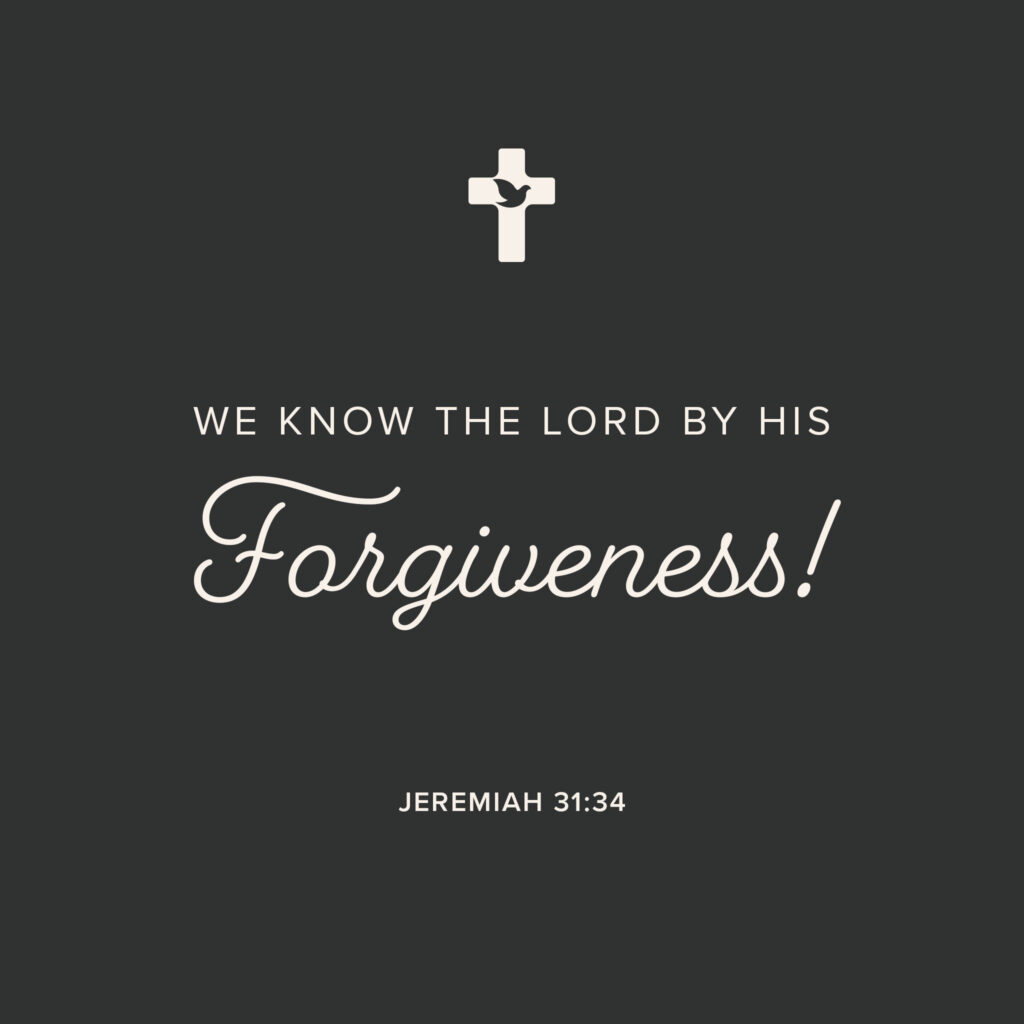April 17, 2025
Pastor Gunnar Ledermann
Jeremiah 31:31-34
Jeremiah 31:31-34
31 “The days are coming,” declares the Lord,
“when I will make a new covenant
with the people of Israel
and with the people of Judah.
32 It will not be like the covenant
I made with their ancestors
when I took them by the hand
to lead them out of Egypt,
because they broke my covenant,
though I was a husband to them,”
declares the Lord.
33 “This is the covenant I will make with the people of Israel
after that time,” declares the Lord.
“I will put my law in their minds
and write it on their hearts.
I will be their God,
and they will be my people.
34 No longer will they teach their neighbor,
or say to one another, ‘Know the Lord,’
because they will all know me,
from the least of them to the greatest,”
declares the Lord.
“For I will forgive their wickedness
and will remember their sins no more.”
Going to Braum’s for an ice cream only to hold it in your hand to watch it melt would be strange. Sure, ice cream might cool off your hand as it melts in the summer sun, but the feeling will not last. In the end, ice cream melting in your hand leaves a sticky mess. Plus, you miss out on eating the sweet treat.
Going across the Red Sea on dry ground led by the hand of God only to turn away from God was strange. Sure, the Israelites had been freed from slavery under the world power of Egypt, but they would quickly face threats from other nations. Israel would learn many times over that worldly freedom does not last, and that following God meant a sweet future.
God promised to establish Israel as his people if they kept his covenant. God promised to establish Israel as a free nation with God backing them militarily, financially, medically, emotionally, politically, socially, spiritually and eternally if they kept the covenant that he gave them after they crossed the Red Sea. The covenant God gave Israel at Mount Sinai is now known as the old covenant. The old covenant laws were meant to keep Israel intact as a nation until Christ came. And if Israel kept God’s laws, he would bless them in the land of Canaan. Plus, God would show his glory and power as the true God to the world through Israel, but Israel broke God’s laws living as wickedly as the other worldly nations as we read in our Old Testament reading from Jeremiah 31,
“they broke my covenant, though I was a husband to them.”
In other words, as strange as it would be for a bride to marry her husband, then never talk to him or live with him, and if fact flirt and jump from the arms of one man to the next, was how strange it was for Israel to agree to God’s covenant given at Mount Sinai after being delivered from Egypt, then turn away from keeping his laws.
When our relationship with God is based on the law, it does not work. The old covenant laws focused on changing outward behavior. For Israel, there were times when they kept God’s laws enjoying periods of peace and prosperity, which turned into times of entitlement and apathy toward God. At other times they were in despair because life was hard when they turned away from God, so they promised to return to him bringing them back to a time of peace and prosperity. This cycled continued until Jeremiah’s time, when God shared that they would not be rescued from their worldly enemies. Jeremiah and the people of Judah whom he served as a prophet saw the last remnants of the worldly kingdom of Judah destroyed by Babylon, even Jerusalem and God’s Temple were destroyed. The same fate threatens us when our relationship with God is based on the law. When we see our relationship with God as a give and take, as if we can force God into blessing us because of our morality, we end up in despair and destroyed. We might see some worldly blessings through moral living, but in the end, we do not always make the best decisions, we are not always good, right or perfect, and we cannot force God’s hand. God is good all the time, we are not. The old covenant laws expose the truth that in all people lives rebellious sin. So, there is no way that we can be involved in keeping a covenant with God for it to work, benefit us, bring joy, etc.
Going to the cross established a new covenant between humanity and God. The old covenant showed Israel that they needed God. Because of sin, God knew the Israelites would grow comfortable, forget and turn away from him even after seeing him fight for their freedom with his ten miraculous plagues and the parting of the Red Sea, so the old covenant would remind them of their sins. This also allowed God to point to new covenant as we heard in our Old Testament reading from Jeremiah 31,
31 “The days are coming,” declares the Lord, “when I will make a new covenant with the people of Israel and with the people of Judah. 34 … “For I will forgive their wickedness and will remember their sins no more.”
God’s new covenant removed the wickedness and sin that prevented the old covenant from working. The new covenant conditions were only dependent on God, so it was kept, and it worked. The conditions and outcome of the new covenant are summed up in Hebrews 9,
15 For this reason Christ is the mediator of a new covenant, that those who are called may receive the promised eternal inheritance—now that he has died as a ransom to set them free from the sins committed under the first covenant.
Going to the cross innocent of sin carrying the sin of the world, Jesus sacrificed his life as the ramson payment for our sins. His blood shed on the cross guaranteed the new covenant, and his payment cannot be undone. Forgiveness for the sins of all people was promised and paid for at the cross. And with our sins forgiven, we now have peace with God.
We are not lost to despair because God has forgiven us through Jesus. God made his new covenant clear at the cross, the empty tomb and in Scripture, and in the Lord’s Supper or communion as we heard in our Gospel reading from Luke 22,
15 And he said to them, “I have eagerly desired to eat this Passover with you before I suffer.”
Jesus was eager to eat his final Passover with his disciples on what we now call Maundy Thursday because he was giving them the new covenant of the forgiveness of sins in his body and blood. At this meal, the disciples received Jesus’ body and blood, and the bread and wine as we read in Luke 22,
19 And he took bread, gave thanks and broke it, and gave it to them, saying, “This is my body given for you; do this in remembrance of me.” 20 In the same way, after the supper he took the cup, saying, “This cup is the new covenant in my blood, which is poured out for you.”
From this point forward, Jesus had given his believers this meal to celebrate together for the forgiveness of their sins.
We no longer know the Lord by his law, but by his forgiveness. Forgiveness is the heart of our relationship with God. The loving work God has done for us has changed us as we hear in our New Testament reading from Hebrews 10 as the writer quotes from Jeremiah 31,
15 The Holy Spirit also testifies to us about this. First he says: 16 “This is the covenant I will make with them after that time, says the Lord. I will put my laws in their hearts, and I will write them on their minds.” 17 Then he adds: “Their sins and lawless acts I will remember no more.” 18 And where these have been forgiven, sacrifice for sin is no longer necessary.
God’s forgiveness means we are his people. The Holy Spirit’s work in our hearts means we know the gospel truth that we are saved through Jesus, and we know God’s will for how we live our lives. We know that there is no more sacrifice and nothing for us to do to save ourselves and fix our relationship with God because it has all been done for us. Our wickedness and sin have been forgiven, so we are free from living a wicked sinful life. Our changed hearts are the reason we now want to and are able to follow God’s will keeping his laws living lives characterized by love and good deeds as we hear in Hebrews 10,
24 And let us consider how we may spur one another on toward love and good deeds, 25 not giving up meeting together, as some are in the habit of doing, but encouraging one another—and all the more as you see the Day approaching.
We continue meeting together as believers to encourage one another with what God has done for us. The new covenant has changed our lives because when we have sinned, we look to God, and when we are eager to live free from sin, we look to God, and when we want to encourage one another, we look to God.
Going to Braum’s for an ice cream only to hold it in your hand to watch it melt would be strange. Going to Braum’s to eat ice cream brings joy. Going across the Red Sea was not only worldly freedom for Israel but showed them a glimpse of God’s power that one day would deliver them from sin. God’s message for Israel through Jeremiah was that as certain as the ten plagues, Passover and crossing of the Red Sea were to Israel, so certain was the new covenant of forgiveness. God message for us is that as certain as Jesus’ perfect life, sacrifice on the cross and empty tomb are, so certain is our forgiveness. In addition to the assurance we have in his Word, God refreshes and feeds our sin weary souls by giving us forgiveness when we celebrate the Lord’s Supper. We do not know God by the law, we know the Lord by his forgiveness. Amen.


